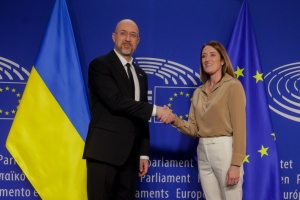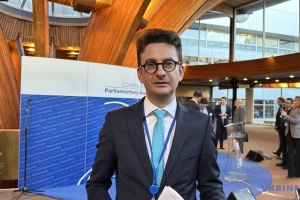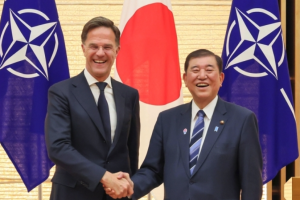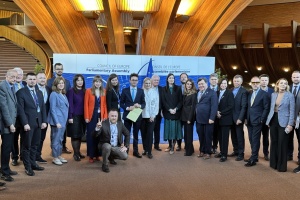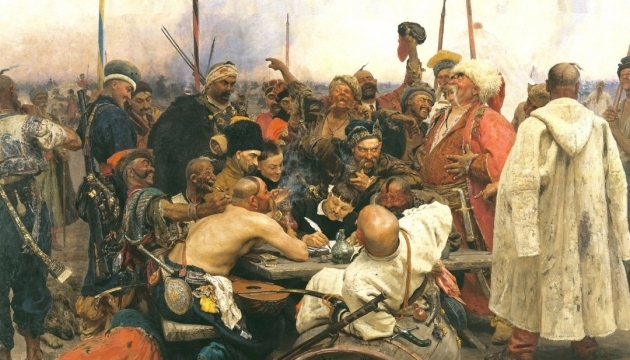
Putin's op-ed: A "robbed" Russia and a deadly threat to Ukraine
It must be admitted that, after promising to ink a piece precisely on why, in his opinion, Russians and Ukrainians are one people, Putin delivered rather quickly. However, his "personal historians" added nothing new on the actual history of the issue: the mix of fictional and biased "facts" seems to have mostly been taken from a school textbook released half a century ago. Everything's done by Dr Goebbels's recipe. This doesn't require a response, some might suggest. In fact, it does – every time they do something like that. By publishing such opuses, they, first of all, consolidate a mass of their "Russian World" adepts in the spirit of what these people aggressively believe in, allowing no other interpretations. What we should go for, in fact, is to do the same, only insisting on actual facts and rights given to the people of Ukraine by God and history. And this must be done persistently, applying all forms of modern communication. It's the Ukrainian narrative that must lay grounds for the perception of national history by the Ukrainian people.
Now let's dwell on Putin's piece a bit more. Putin has pretty much proclaimed that the Ukrainians, their language, and state cannot exist without the consent of their "elder sibling;" and that he will make every effort to this end. Besides, the op-ed personally signed by Putin is a direct challenge to the whole of Ukraine, as well as evidence that some serious trials are facing us. So let's figure out why exactly he chose this timing and what should we get prepared for.
First comes a Soviet-era textbook
We will not deeply analyze the historical views outlined by Putin. We have already done this recently immediately following his "Direct Line" Q&A on June 30. Is it really so important for us to see what exactly Putin is declaring? He really does believe that, if a separate nation has its own language and name, and identifies itself with these features, this doesn't really mean anything as "[m]ost importantly, people both in the western and eastern Russian lands spoke the same language. Their faith was Orthodox. Up to the middle of the 15th century, the unified church government remained in place." There are no facts confirming this "spoke the same language" claim, and there can't be any, while the common language in church books couldn't be fundamentally different, just as Latin couldn’t be any different among Catholics.
Putin doesn't want to learn and understand anything at all about the peculiarities of the former Rus lands being ruled by foreign powers – be it the Horde or Lithuania. Moreover, he doesn't understand at all that in fact there was no seizure or conquest of modern Ukrainian lands by the Grand Duchy of Lithuania – it was an accession with the preservation of local traditions and customs, as well as the adoption of language and faith (Putin is frankly lying about the alleged adoption of Catholicism by the Lithuanian elite in XIV century. What happened in fact was... the adoption of Orthodoxy). For some reason, his condescending theses about the princes servicing various overlords are not supported by any remarks about the princes on the territory of modern Russia serving the Horde.
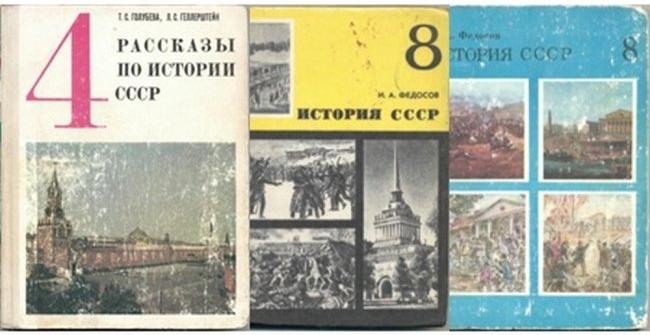
Such simplification is precisely a feature of the high school level of understanding history, all the more so if it's studied in a shape imposed by state ideology. It makes no sense to keep listing and analyzing all inconsistencies as the sources of such views on the very complex process of the formation of the three East Slavic peoples are clear – their roots lie deeply in Soviet children's readiness to trust their lying textbooks. Also, the imperial component adds up to this because the fiction about the three-headed Russian people - the Great Russians, the Little Russians, and the Belarusians – is the cornerstone of historiography preaches in the times of Alexander III, to whom, I believe, Putin has recently opened two posh monuments. He has done it for a good reason, it appears.
Also, his KGB-molded worldview adds a political explanation – it's the enemies who sought to embroil the brothers (here's a quote): "In the 16th century, it signed the Union of Lublin with the Kingdom of Poland to form the Polish–Lithuanian Commonwealth. […]The process of Polonization and Latinization began, ousting Orthodoxy." So here it is, the external enemy I was talking about. Further, as per Putin, things were going on with the same flow, right up to the 20th century: the heroic Russians were defending the weaker Ukrainians, while the Poles and Austro-Hungarians were only oppressing the latter.
It's interesting to see Putin justify the emergence in the Russian Empire of the anti-Ukrainian Valuev Circular of 1863 and the Ems Decree of 1876: "I am not going to idealise anything. We do know there were the Valuev Circular of 1863 and then the Ems Ukaz of 1876, which restricted the publication and importation of religious and socio-political literature in the Ukrainian language. But it is important to be mindful of the historical context. These decisions were taken against the backdrop of dramatic events in Poland and the desire of the leaders of the Polish national movement to exploit the 'Ukrainian issue' to their own advantage."
This isn't your land
The "Putinwriters" decided to lay out their new stuff and main ideological theses in paragraphs covering the events of the 20th century. They are replete of statements openly denying Ukraine and Ukrainians the right to separate existence. Here is how they interpret the signing in late January 1918 by representatives of the Ukrainian People's Republic (UPR) of the Brest-Litovsk peace treaty with the members of the Quadruple Alliance, primarily Germany and Austria-Hungary: "The declared sovereignty did not last long. Just a few weeks later, Rada delegates signed a separate treaty with the German bloc countries. Germany and Austria-Hungary were at the time in a dire situation and needed Ukrainian bread and raw materials. In order to secure large-scale supplies, they obtained consent for sending their troops and technical staff to the UPR. In fact, this was used as a pretext for occupation." Nothing about Lenin's ultimatums to the Central Rada voiced in December 1917, or the military aggression by Bolsheviks and attempts to sow chaos in Ukraine from within, or the battle of Kruty… By the way, neither there is any mention of the fact that Lenin publicly admitted: the Bolsheviks need Ukrainian bread and raw materials. Isn't it strange? Some "rightfully" need this all, while others don't, right?
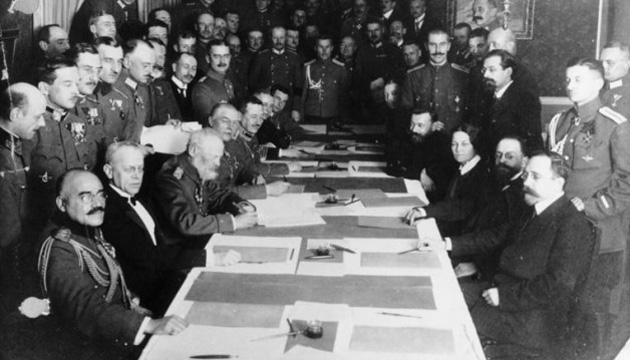
Signing of peace treaty in Brest-Litovsk
And most importantly, the very right of Ukrainians is being denied to declare independence and pursue independent activity in foreign policy. By the way, Germany and its allies did recognize UPR's independence back then, although there's not a word from Putin in this regard.
Besides, here's the cornerstone thesis of what Putin wants to impose on his audiences about the process of the USSR founding: "[A] rather fierce debate among the Bolshevik leaders resulted in the implementation of Lenin's plan to form a union state as a federation of equal republics. The right for the republics to freely secede from the Union was included in the text of the Declaration on the Creation of the Union of Soviet Socialist Republics and, subsequently, in the 1924 USSR Constitution. By doing so, the authors planted in the foundation of our statehood the most dangerous time bomb."[...] "On 8 December 1991, the so-called Belovezh Agreement on the Creation of the Commonwealth of Independent States was signed." Conclusion: none of the peoples that were part of the USSR should have been given the right to pull out in the first plays as they should only remain closely attached to Russia, in the same grip of collective consciousness and history.
And then come two more very peculiar quotes: "Therefore, modern Ukraine is entirely the product of the Soviet era. We know and remember well that it was shaped – for a significant part – on the lands of historical Russia. To make sure of that, it is enough to look at the boundaries of the lands reunited with the Russian state in the 17th century and the territory of the Ukrainian SSR when it left the Soviet Union" and "You want to establish a state of your own: you are welcome! But what are the terms?" And the conclusion Putin is offering is that Russia was territorially "robbed, indeed."
Here, again, everything is on the surface. Putin is confident that if some territory was once conquered, then it should be organically woven into common traditions, just becoming part of a single organism, like a hand or a foot. As for that peoples-languages-traditions-history thing, why complicate everything? Meanwhile, Putin's silent on what Russia would look like when applying this principle on itself – that would be without Sakhalin in the east and Kaliningrad in the west. That's not to mention Taganrog, Kuban and half of the Voronezh and Kursk regions... If a principle is applied of "let everyone withdraw taking what they came with," it will turn out that, say, the countries in modern Central Asia have virtually no right to exist as such. After all, when the USSR was founded, they were all part of Soviet Russia (RSFSR) as autonomies. I hope everyone has caught Putin's hint and sees the prospects clear now.
What are the grounds for this all? It's a typical imperial approach. On the territory controlled by the metropolis, everything is always "fine" as colonialists bring the "light of civilization" to all the savage people out there. There are no alternatives. What does this lead to? To the great blood spill during the collapse of empires as Britain once saw its India, and France – in Algeria. The Russian Empire began to disintegrate in 1917. It was then that the nations it reigned over, including the Ukrainians, were able to create their own states. But the Bolsheviks, putting forward a new project of world order, managed to stop this process, in most cases by coercion and corruption, ensuring a U-turn to create a new empire. And Putin is precisely the heir of this empire, of its very idea, regardless of its name.

Putin won't stop
Putin concludes his piece with the usual nonsensical claim about modern Ukraine being "anti-Russia" and an outright threat: "And we will never allow our historical territories and people close to us living there to be used against Russia. And to those who will undertake such an attempt, I would like to say that this way they will destroy their own country."
And this right here poses a direct challenge to the entire Ukrainian society. Putin won't stop. He actually believes that Ukraine is a sort of a Little Russia with its embroidered vyshyvanka shirts, dumplings, and the hopak dance, that Ukrainians are not entitled for their own state and independence. And he will continue to fight for his claims – that's, of course, if others allow him to.
What about the timing?
A fundamental question is why exactly Putin has chosen this timing to disturb these muddy waters. He could be pursuing several goals here.
Firstly, this could be a sort of "Dark Mark" for Ukraine's political elite. Putin just doesn't accept current Ukrainian authorities, especially given the latest sanctions introduced against his emissary Viktor Medvedchuk. This is a rejection of dialogue and, in fact, a halt to any hypothetical steps towards reconciliation that would take Ukraine's interests into account.
Secondly, this is an attempt to mobilize the "fifth column" within Ukraine, to show that no one has abandoned the "vatniks" [a colloquial term for pro-Russian circles] here, and everything will continue as it is – through spinning such "holiday sets" of the imperial mind's delusions about the "brotherly peoples" that the insidious West and the Kyiv authorities have been setting against each other. As means to make things implode, "ritual" murders of some activists promoting the "Russian world" in Ukraine could be applied. Also, even more significant figures could fall victim to the plot. Yet another mention of the "Odesa Khatyn" of 2014, the murders and pogroms, which never even happened at all, is a warning of what might happen next. The card of Ukrainians working in Russia can also be played: they could be offered Russian passports, or, on the contrary, told to leave the territory of the Russian Federation, thus being forced to return to Ukraine with no money or job. Isn't this the right "fuel" for street riots?
Thirdly, this is a propaganda product for domestic consumption in Russia ahead of the election. Against the backdrop of an ongoing pandemic and its latest wave, dubious vaccination successes, and price hikes that the government can't deal with, something is required to keep people distracted from the said issues. Another round of anti-Ukrainian hysteria: what else is needed to rally the electorate before the September vote?
Fourthly, as per Putin's entourage, this is about rising stakes in bargaining with the West and designating the boundaries of Russia's influence. And they don't seem to care that the West has long been aware of what these efforts are worth. The main thing for them is not to miss the moment for playing the bet right.
What should Ukraine do?
Well, there's nothing new, actually: Ukrainians must understand that these are not just words and that the threat hasn't gone anywhere. They mustn't accept any offers to just "settle" somehow. They must simply realize that this is about the very existence of Ukraine as such. Putin doesn't see this country in his model of future at all. Do we see it there? And, yes, how do we see it?
Separately, it's necessary to speak out beyond Ukraine. In response to such an op-ed, at least another one should be published, with our view of the historical relations of the Russian and Ukrainian peoples and an explanation of the obvious – WHY EVERY NATION IN THE WORLD IS ENTITLED FOR ITS OWN STATE AND INDEPENDENCE. But this should be more than an article. This better be a whole program worked out in the information domain.
Simple answers to tough questions or simple solutions to tough problems always lead to negative consequences. Therefore, right now WE NEED TO MAKE EXTRAORDINARY EFFORT TO PROVE OWN RIGHT. WE MUST BE HEARD TO ENSURE THAT OTHERS AGREE WITH US.
Viktor Chopa, Kyiv

